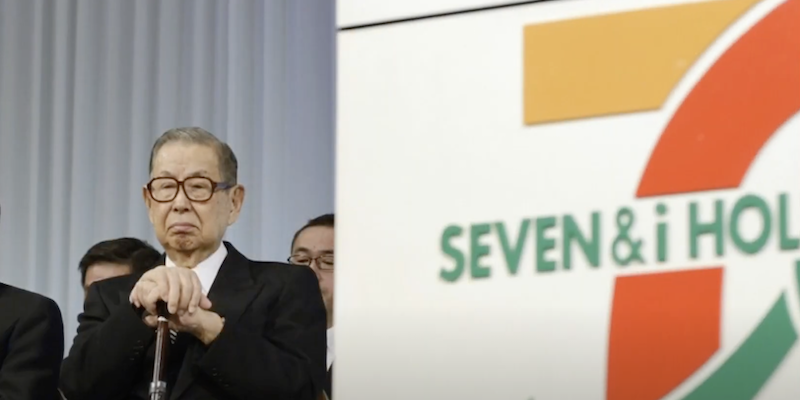Loading player
The Japanese billionaire has died at the age of 98 Ito Masatoshi, the entrepreneur who brought the US convenience store chain 7-Eleven to Japan and turned it into a successful company, with tens of thousands of stores in different parts of the world. Ito acquired the convenience store chain already known in the United States because you could find a little bit of everything there, at all hours, and made it a recognizable and widespread brand especially in Asia, which now hosts many locations. Ito died on March 10, but the news was given on Monday by Seven & i Holdings, the Japanese company that now controls the chain.
7-Elevens are small supermarkets that sell a little bit of everything from potato chips and donuts to drinks and convenience foods to basic medicines. They are mostly located in the central areas of cities and are frequented above all by those who need something on the go, also because they are often open 24 hours a day. Even if they were born in the United States, today there are also hundreds in Canada, Australia and Scandinavia , but above all in Japan, where there are almost 21,000.
The history of 7-Eleven it began in Texas in 1927 with the merger of several ice distribution companies before refrigerators became widespread in American homes. The first convenience store selling a little bit of everything opened in Dallas, and then others followed. The chain was called Tote’m Stores, because the things you bought there could be carried by hand or in a bag (tote in English). In 1946, in an attempt to attract more customers in the difficult immediate post-war period, its name was changed to “7-Eleven” to more clearly indicate the opening hours of the shops, from 7 to 23, 7 days a week: a something that was unprecedented at the time.
In the same years, Ito had just graduated from Japan. Born on April 30, 1924 in Tokyo, he was the son of traders who sold food and vegetables: after fighting in the Second World War, Work briefly in a coal mining company and in 1958 he became the president of Yokado, his uncle’s small clothing store in the Asakusa district of Tokyo. Building on the model of supermarkets that had spread across the United States, Ito changed the name of the store to Ito-Yokado and began selling everything from food to other staples.
In the 1970s, Ito-Yokado made an agreement with the US company that controlled 7-Eleven, which in the meantime had transformed into the Southland Corporation, and in 1974 opened the first 7-Eleven in Tokyo. In the same year, the first restaurant of the US fast food chain Denny’s also opened in Japan.
A 7-Eleven convenience store in Hyogo Province, near Kyoto and Osaka (Wikimedia Commons)
For his entrepreneurial skills and success in expanding the 7-Eleven brand, Ito was nicknamed the “Sam Walton” of Japan, a reference to the founder of the US supermarket chain Walmart, the world‘s largest supermarket chain. big organised distribution. In 1991, in a time of crisis for the Southland Corporation, Ito-Yokado acquired the majority shares of the US company and in the following years continued to expand the chain of convenience stores in various Asian countries.
With approx 83 miles stores in 19 countries and regions of the world, today 7-Eleven is the most widespread convenience store chain ever: about a quarter of its stores are located in Japan, and then there are more than 20,000 between Thailand and South Korea, about 9,400 in the United States and thousands more in China, Taiwan, the Philippines, India, Malaysia, Mexico and other countries.
It was in 1992 he resigned from the role of president of Ito-Yokado for a case of alleged bribes that some company officials allegedly paid to a criminal group. In 2005 the new president, Suzuki Toshifumi, an old collaborator of him, transformed Ito-Yokado into Seven & i Holdings, and 7-Eleven Inc was also born as a subsidiary. The “i” in Seven & i Holdings was a reference to the name of the old company, but above all to that of Ito, who was appointed honorary president.
Today, in addition to controlling the 7-Eleven chain, Seven & i Holdings operates a whole other set of businesses, including approximately 3,900 Speedway convenience stores, located at gas stations primarily in the Midwest and eastern United States. United.
– Read also: Economically, Japan is doing things the other way around
